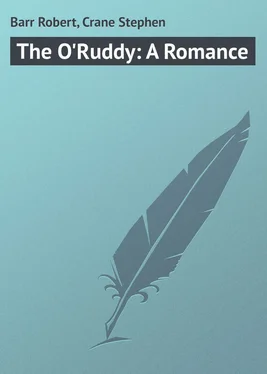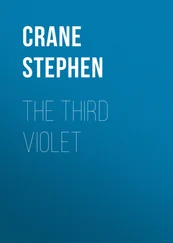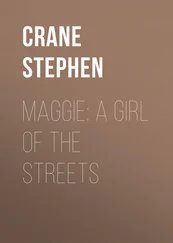Stephen Crane - The O'Ruddy - A Romance
Здесь есть возможность читать онлайн «Stephen Crane - The O'Ruddy - A Romance» — ознакомительный отрывок электронной книги совершенно бесплатно, а после прочтения отрывка купить полную версию. В некоторых случаях можно слушать аудио, скачать через торрент в формате fb2 и присутствует краткое содержание. Издательство: Иностранный паблик, Жанр: Прочие приключения, foreign_prose, на английском языке. Описание произведения, (предисловие) а так же отзывы посетителей доступны на портале библиотеки ЛибКат.
- Название:The O'Ruddy: A Romance
- Автор:
- Издательство:Иностранный паблик
- Жанр:
- Год:неизвестен
- ISBN:нет данных
- Рейтинг книги:4 / 5. Голосов: 1
-
Избранное:Добавить в избранное
- Отзывы:
-
Ваша оценка:
- 80
- 1
- 2
- 3
- 4
- 5
The O'Ruddy: A Romance: краткое содержание, описание и аннотация
Предлагаем к чтению аннотацию, описание, краткое содержание или предисловие (зависит от того, что написал сам автор книги «The O'Ruddy: A Romance»). Если вы не нашли необходимую информацию о книге — напишите в комментариях, мы постараемся отыскать её.
The O'Ruddy: A Romance — читать онлайн ознакомительный отрывок
Ниже представлен текст книги, разбитый по страницам. Система сохранения места последней прочитанной страницы, позволяет с удобством читать онлайн бесплатно книгу «The O'Ruddy: A Romance», без необходимости каждый раз заново искать на чём Вы остановились. Поставьте закладку, и сможете в любой момент перейти на страницу, на которой закончили чтение.
Интервал:
Закладка:
I decided that I must go for a walk. To sit and gloom in my room until the time of the great affair would do me no good in any case. In fact it was likely to do me much harm. I went forth to the garden in the rear of the inn. Here spread a lawn more level than a ballroom floor. There was a summer-house and many beds of flowers. On this day there was nobody abroad in the garden but an atrocious parrot, which, balancing on its stick, called out continually raucous cries in a foreign tongue.
I paced the lawn for a time, and then took a seat in the summer-house. I had been there but a moment when I perceived Lady Mary and the Countess come into the garden. Through the leafy walls of the summer-house I watched them as they walked slowly to and fro on the grass. The mother had evidently a great deal to say to the daughter. She waved her arms and spoke with a keen excitement.
But did I overhear anything? I overheard nothing! From what I knew of the proper conduct of the really thrilling episodes of life I judged that I should have been able to overhear almost every word of this conversation. Instead, I could only see the Countess making irritated speech to Lady Mary.
Moreover it was legitimate that I should have been undetected in the summer-house. On the contrary, they were perfectly aware that there was somebody there, and so in their promenade they presented it with a distinguished isolation.
No old maid ever held her ears so wide open. But I could hear nothing but a murmur of angry argument from the Countess and a murmur of gentle objection from Lady Mary. I was in possession of an ideal place from which to overhear conversation. Almost every important conversation ever held had been overheard from a position of this kind. It seemed unfair that I, of all men in literature, should be denied this casual and usual privilege.
The Countess harangued in a low voice at great length; Lady Mary answered from time to time, admitting this and admitting that, protesting against the other. It seemed certain to me that talk related to Forister, although I had no real reason for thinking it. And I was extremely angry that the Countess of Westport and her daughter, Lady Mary Strepp, should talk of Forister.
Upon my indignant meditations the parrot interpolated:
"Ho, ho!" it cried hoarsely. "A pretty lady! A pretty lady! A pretty lady! A pretty lady! – "
Lady Mary smiled at this vacuous repetition, but her mother went into a great rage, opening her old jaws like a maddened horse. "Here, landlord! Here, waiter! Here, anybody!"
So people came running from the inn, and at their head was, truly enough, the landlord. "My lady," he cried panting.
She pointed an angry and terrible finger at the parrot. "When I walk in this garden, am I to be troubled with this wretched bird?"
The landlord almost bit the turf while the servants from the inn grovelled near him. "My lady," he cried, "the bird shall be removed at once." He ran forward. The parrot was chained by its leg to a tall perch. As the innkeeper came away with the entire business, the parrot began to shout: "Old harridan! Old harridan! Old harridan!" The innkeeper seemed to me to be about to die of wild terror. It was a dreadful moment. One could not help but feel sorry for this poor wretch, whose sole offence was that he kept an inn and also chose to keep a parrot in his garden.
The Countess sailed grandly toward the door of the hotel. To the solemn protestations of six or seven servants she paid no heed. At the door she paused and turned for the intimate remark. "I cannot endure parrots," she said impressively. To this dictum the menials crouched.
The servants departed: the garden was now empty save for Lady Mary and me. She continued a pensive strolling. Now, I could see plainly that here fate had arranged for some kind of interview. The whole thing was set like a scene in a theatre. I was undoubtedly to emerge suddenly from the summer-house; the lovely maid would startle, blush, cast down her eyes, turn away. Then, when it came my turn, I would doff my hat to the earth and beg pardon for continuing a comparatively futile existence. Then she would slyly murmur a disclaimer of any ability to criticise my continuation of a comparatively futile existence, adding that she was but an inexperienced girl. The ice thus being broken, we would travel by easy stages into more intimate talk.
I looked down carefully at my apparel and flecked a handkerchief over it. I tilted my hat; I set my hip against my harbour. A moment of indecision, of weakness, and I was out of the summer-house. God knows how I hoped that Lady Mary would not run away.
But the moment she saw me she came swiftly to me. I almost lost my wits.
"'Tis the very gentleman I wished to see," she cried. She was blushing, it is true, but it was evident she intended to say nothing about inexperience or mere weak girls. "I wished to see you because – " she hesitated and then rapidly said: "It was about the papers. I wanted to thank you – I – you have no notion how happy the possession of the papers has made my father. It seemed to have given him new life. I – I saw you throw your sword on the floor with the hilt away from you. And – and then you gave me the papers. I knew you were a gallant gentleman."
All this time, I, in my confusion, was bobbing and murmuring pledges of service. But if I was confused, Lady Mary was soon cool enough in the presence of a simple bog-trotter like me. Her beautiful eyes looked at me reflectively.
"There is only one service I can render you, sir," said she softly. "'Tis advice which would have been useful in saving some men's lives if only they had received it. I mean – don't fight with Forister in the morning. 'Tis certain death."
It was now my turn once more. I drew myself up, and for the first time I looked squarely into her bright eyes.
"My lady," said I, with mournful dignity, "I was filled with pride when you said the good word to me. But what am I to think now? Am I, after all, such a poor stick that, to your mind, I could be advised to sell my honour for a mere fear of being killed?"
Even then I remembered my one-time decision to run away from the duel with Forister; but we will not be thinking of that now.
Tears came into Lady Mary's eyes. "Ah, now, I have blundered," she said. "'Tis what you would say, sir. 'Tis what you would do. I have only made matters worse. A woman's meddling often results in the destruction of those she – those she don't care to have killed."
One would think from the look of this last sentence, that with certain reason I could have felt somewhat elated without being altogether a fool. Lady Mary meant nothing of importance by her speech, but it was a little bit for a man who was hungry to have her think of him. But here I was assailed by a very demon of jealousy and distrust. This beautiful witch had some plan in her head which did not concern my welfare at all. Why should she, a great lady, take any trouble for a poor devil who was living at an inn on money borrowed from a highwayman. I had been highly honoured by an indifferent consideration born of a wish to be polite to a man who had eased the mind of her father. No; I would not deceive myself.
But her tears! Were they marking indifferent consideration? For a second I lost myself in a roseate impossible dream. I dreamed that she had spoken to me because she —
Oh, what folly! Even as I dreamed, she turned to me with splendid carriage, and remarked coldly:
"I did not wish you to suppose that I ever failed to pay a debt. I have paid this one. Proceed now, sir, in your glowing stupidity. I have done."
When I recovered myself she was placidly moving away from me toward the door of the inn.
CHAPTER IX
I had better be getting to the story of the duel. I have been hanging back with it long enough, and I shall tell it at once. I remember my father saying that the most aggravating creature in life was one who would be keeping back the best part of a story through mere reasons of trickery, although I have seen himself dawdle over a tale until his friends wished to hurl the decanters at him. However, there can be no doubting of the wisdom of my father's remark. Indeed there can be little doubting of the wisdom of anything that my father said in life, for he was a very learned man. The fact that my father did not invariably defer to his own opinions does not alter the truth of those opinions in my judgment, since even the greatest of philosophers is more likely to be living a life based on the temper of his wife and the advice of his physician than on the rules laid down in his books. Nor am I certain that my father was in a regular habit of delaying a story. I only remember this one incident, wherein he was recounting a stirring tale of a fight with a lancer, and just as the lance was within an inch of the paternal breast my father was reminded, by a sight of the walnuts, that Mickey Clancy was not serving the port with his usual rapidity, and so he addressed him. I remember the words well.
Читать дальшеИнтервал:
Закладка:
Похожие книги на «The O'Ruddy: A Romance»
Представляем Вашему вниманию похожие книги на «The O'Ruddy: A Romance» списком для выбора. Мы отобрали схожую по названию и смыслу литературу в надежде предоставить читателям больше вариантов отыскать новые, интересные, ещё непрочитанные произведения.
Обсуждение, отзывы о книге «The O'Ruddy: A Romance» и просто собственные мнения читателей. Оставьте ваши комментарии, напишите, что Вы думаете о произведении, его смысле или главных героях. Укажите что конкретно понравилось, а что нет, и почему Вы так считаете.












